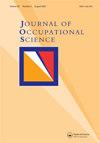Occupational transaction in support of miyupimaatisiiun (wellness): Eeyou/Eenou community voices
IF 2.4
Q1 SOCIAL SCIENCES, INTERDISCIPLINARY
引用次数: 1
Abstract
ABSTRACT This paper presents the results of a community-based study on participation in miyupimaatisiiun (wellness) planning, conducted in partnership with the Eeyou Istchee Cree Nation (Northern Québec, Canada). Nested within a broader developmental and participatory evaluation undertaken by the regional Cree Board of Health and Social Services of James Bay, the study aimed to generate an in-depth understanding of community perspectives on their participation and engagement in local miyupimaatisiiun (wellness) committees (MCs). Over 4 years (2016-2020), 13 visits to four communities, 22 individual conversation-based interviews, and 50 hours of community-based activity observations took place. Data were analysed using an occupational transaction lens to co-construct the meanings and processes of participation in planning for miyupimaatisiiun, and how participants perceive and coordinate their actions with local, regional, and global contexts. This manuscript, the first of two, presents results for three themes addressing the meaning, processes, and challenges to participation: 1) healing from residential school trauma and its intergenerational impacts; 2) revitalizing Cree culture for miyupimaatisiiun, and 3) decolonizing health and wellness systems and policies. Through the concept of ‘occupational consciousness,’ this research suggests that MC members were drawing on their awareness of colonial influences on their own journeys towards healing and cultural recovery as they planned and designed occupations that support community wellness. Implications include the need for cross-community sharing on ways forward for strengthening community cohesion, as well as for improved regional entity acknowledgement of community capacity.职业交易支持miyuupimatition(健康):Eeyou/Eenou社区声音
摘要本文介绍了一项基于社区的参与miyupimaatisiun(健康)规划研究的结果,该研究是与Eeyou Istchee Cree民族(加拿大魁北克北部)合作进行的。该研究嵌套在詹姆斯湾地区克里族卫生和社会服务委员会进行的更广泛的发展和参与性评估中,旨在深入了解社区对他们参与和参与当地健康委员会的看法。在4年多的时间里(2016-2020),对四个社区进行了13次访问,22次基于个人对话的采访,50次 进行了数小时的社区活动观察。使用职业交易视角对数据进行分析,以共同构建参与miyupimaatisiun规划的含义和过程,以及参与者如何感知和协调他们的行动与当地、区域和全球背景。这是两份手稿中的第一份,介绍了三个主题的结果,涉及参与的意义、过程和挑战:1)从寄宿学校创伤中康复及其代际影响;2) 为miyupimaatisiun振兴克里族文化,以及3)使健康和保健系统和政策非殖民化。通过“职业意识”的概念,这项研究表明,MC成员在规划和设计支持社区健康的职业时,利用了他们对殖民影响的意识,在他们自己的康复和文化恢复之旅中。所涉问题包括需要跨社区分享加强社区凝聚力的前进道路,以及改进区域实体对社区能力的认识。
本文章由计算机程序翻译,如有差异,请以英文原文为准。
求助全文
约1分钟内获得全文
求助全文
来源期刊

Journal of Occupational Science
SOCIAL SCIENCES, INTERDISCIPLINARY-
CiteScore
4.30
自引率
41.70%
发文量
46
 求助内容:
求助内容: 应助结果提醒方式:
应助结果提醒方式:


